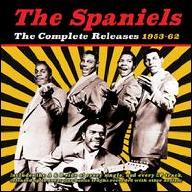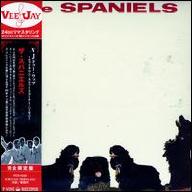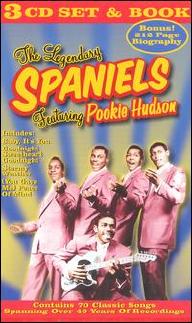The story of how the Spaniels came to prominence begins in late 1952, when lead singer Hudson was convinced by four of his Roosevelt High classmates -- Ernest Warren (first tenor), Opal Courtney, Jr. (baritone), Willie Jackson (second tenor), and Gerald Gregory (bass) to join them for a school talent show. They had debuted as Pookie Hudson and the Hudsonaires for the Christmas show and fared so well they decided to continue. Not wanting to join the bird group club (Orioles, Ravens, etc.), they decided on the name Spaniels.
In the spring, the group visited the local record shop owned by James and Vivian Brackens, who had begun developing a record label called Vee-Jay Records. They soon moved their operation to Chicago, in a garage off 47th Street (later they would relocate to offices at 1449 South Michigan Avenue). The Spaniels were one of the first two artists signed to the label (the other was blues guitarist Jimmy Reed). On May 5, 1953, the Spaniels recorded "Baby It's You," released in July. On September 5, "Baby" hit number ten on the national R&B best-seller charts.
The Spaniels' next session produced additional singles, including "Goodnight, Sweetheart, Goodnight," which took off in March 1954, but it took about six months for the record to break nationally, charting at number five on the R&B charts. Its success prompted the McGuire Sisters to cover it for the "white" market, stealing a lot of the Spaniels' thunder when their version landed in the Top Ten (number seven).
The Spaniels' next single, "Let's Make Up," earned more for songwriter Hudson as someone else's B-side when it appeared on the flip of the Top 20 hit "The Ballad of Davy Crockett" (number 14, 1955). On June 11, 1954, the Spaniels made the first of numerous appearances at the Apollo Theatre and began touring the greater Midwest. Another single, "You Painted Pictures," reached number 13 R&B in October.
After Opal Courtney, Jr. was drafted, Vee-Jay A&R man and Spaniels producer Calvin Carter was pressed into service during their road trips for a few months until James Dimples Cochran took over permanently. Shortly thereafter, Ernest Warren was drafted and the group continued recording as a quartet. Two subsequent Spaniels singles failed to connect. Disappointed, Pookie Hudson and Willie Jackson both decided to leave the group. The Spaniels bravely continued, with Carl Rainge (lead), Gerald Gregory (bass), James Cochran (baritone), and Don Porter (second tenor). This contingent lasted for only one single until Pookie rejoined.
In April 1957, Vee-Jay released their first full-length album, Goodnight, It's Time to Go. By mid-summer, the group was back to turning out terrific singles. Incidentally, around this same time, Hank Ballard (of Hank Ballard the Midnighters) had just rewritten the Drifters' 1955 number two pop hit "What'cha Gonna Do" -- already a revision of an old gospel tune, "What're You Going to Do" -- and offered his rewrite, called "The Twist," to the Spaniels, but they passed on it. It later became a number one hit for Ernest Evans, who recorded it under the name Chubby Checker.
By 1960, the Spaniels comprised Hudson, Ernest Warren, Gerald Gregory, Bill Carey, and Andy Magruder (former lead of the Five Blue Notes). They recorded the group's last Vee-Jay single, "I Know," in 1960; it reached number 23 R&B that summer. Meanwhile, Vee-Jay issued a second full-length album.
A year later, Magruder and Gregory left the group, and they broke up briefly after trying to sort out what to do. Road manager Ricky Burden took over on bass for the group's recording for Neptune. Hudson did a few solo sides for Jamie and in 1962 recorded with the Imperials (minus Little Anthony) for Lloyd Price's Double-L label. In the late '60s, Hudson formed his own North American Records and issued "Fairytales," which was picked up by Nate McCalla's Calla Records (distributed by Roulette). It became Pookie's last charting single (number 45 R&B) in the fall of 1970.
Two more singles were issued in the early '70s with a new Spaniels lineup: Hudson, Charles Douglas (first tenor), Alvin Wheeler (second tenor), Alvin Lloyd (baritone), and former guitarist for the group Pete Simmons (bass). He was later replaced by Andrew Lawyer (the Truetones) when the group recorded a remake of "Goodnight, Sweetheart, Goodnight" for Buddah. Their last release was for Henry Farag's Canterbury label in Gary, Indiana in 1974. Up until the time they disbanded, Hudson and the Spaniels were one of the more in-demand acts on the oldies circuit. ~ Bryan Thomas, Rovi
















